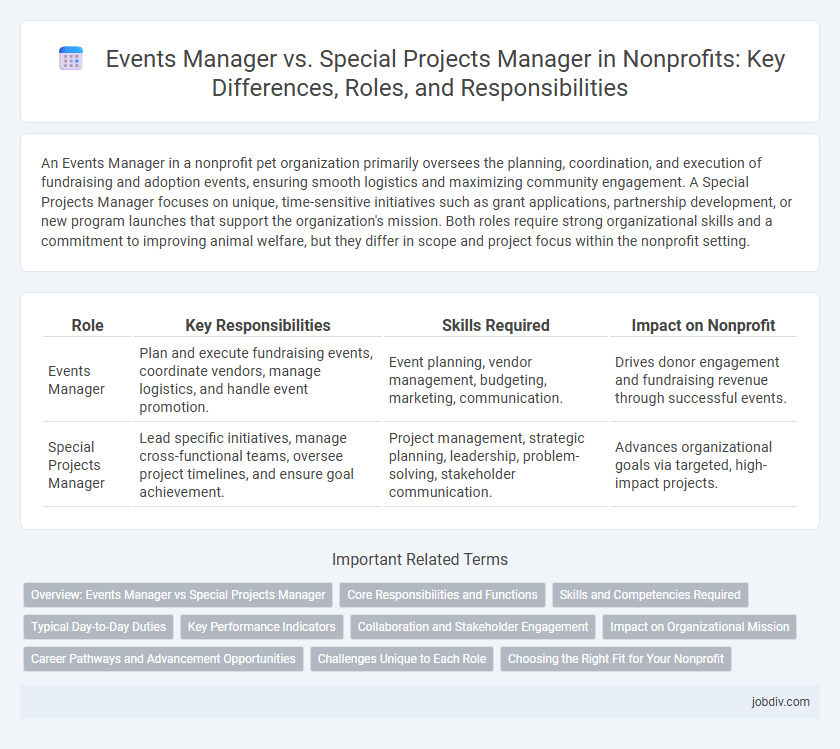An Events Manager in a nonprofit pet organization primarily oversees the planning, coordination, and execution of fundraising and adoption events, ensuring smooth logistics and maximizing community engagement. A Special Projects Manager focuses on unique, time-sensitive initiatives such as grant applications, partnership development, or new program launches that support the organization's mission. Both roles require strong organizational skills and a commitment to improving animal welfare, but they differ in scope and project focus within the nonprofit setting.
Table of Comparison
| Role | Key Responsibilities | Skills Required | Impact on Nonprofit |
|---|---|---|---|
| Events Manager | Plan and execute fundraising events, coordinate vendors, manage logistics, and handle event promotion. | Event planning, vendor management, budgeting, marketing, communication. | Drives donor engagement and fundraising revenue through successful events. |
| Special Projects Manager | Lead specific initiatives, manage cross-functional teams, oversee project timelines, and ensure goal achievement. | Project management, strategic planning, leadership, problem-solving, stakeholder communication. | Advances organizational goals via targeted, high-impact projects. |
Overview: Events Manager vs Special Projects Manager
Events Managers in nonprofits specialize in planning, coordinating, and executing fundraising galas, community outreach events, and donor appreciation programs to boost engagement and revenue. Special Projects Managers focus on overseeing targeted initiatives such as grant-funded programs, strategic campaigns, or organizational development projects that align with the nonprofit's mission and long-term goals. Both roles require strong project management skills, but Events Managers emphasize event logistics and attendee experience, while Special Projects Managers prioritize cross-departmental collaboration and impact measurement.
Core Responsibilities and Functions
Events Managers in nonprofits organize fundraising galas, community outreach programs, and volunteer recruitment events, ensuring logistics, vendor coordination, and attendee engagement are efficiently managed. Special Projects Managers oversee critical initiatives such as grant implementation, strategic planning, and cross-departmental collaboration, focusing on timelines, budget management, and stakeholder communication. Both roles require strong organizational skills, but Events Managers concentrate on event execution while Special Projects Managers drive complex projects to meet organizational goals.
Skills and Competencies Required
An Events Manager in the nonprofit sector requires expertise in logistics coordination, vendor negotiation, and audience engagement to successfully plan and execute fundraising and awareness events. A Special Projects Manager must demonstrate advanced strategic planning, cross-functional team leadership, and adaptability to manage diverse initiatives that drive organizational impact and innovation. Both roles demand strong communication, problem-solving abilities, and proficiency in project management software to ensure seamless operations and measurable outcomes.
Typical Day-to-Day Duties
An Events Manager in a nonprofit primarily coordinates logistics, manages vendor relationships, and oversees event execution to ensure successful fundraising and community engagement activities. A Special Projects Manager focuses on planning, implementing, and monitoring unique initiatives or campaigns that align with the organization's strategic goals, often collaborating with multiple departments. Both roles require strong organizational skills and communication but differ in scope, with Events Managers handling recurring events and Special Projects Managers tackling diverse, one-off projects.
Key Performance Indicators
Events Managers in nonprofits primarily measure success through event attendance rates, fundraising revenue generated, and participant engagement levels to evaluate program impact. Special Projects Managers focus on KPIs such as project completion timelines, budget adherence, stakeholder satisfaction, and the achievement of strategic goals aligned with organizational missions. Both roles rely on data-driven insights but differ in scope, with Events Managers emphasizing operational efficiency and donor experience, while Special Projects Managers prioritize cross-functional collaboration and long-term project outcomes.
Collaboration and Stakeholder Engagement
Events Managers specialize in coordinating logistics and executing nonprofit events that foster community engagement and donor relations, ensuring seamless collaboration among vendors, volunteers, and sponsors. Special Projects Managers focus on cross-departmental initiatives, driving strategic partnerships and aligning stakeholder objectives to advance organizational goals. Both roles require strong communication skills to build trust and facilitate cooperation between internal teams and external stakeholders.
Impact on Organizational Mission
An Events Manager drives organizational mission by orchestrating fundraising and awareness events that engage donors and increase community support, directly boosting financial resources and visibility. A Special Projects Manager advances the mission through strategic initiatives that address specific challenges or opportunities, often leading to innovative programs or partnerships that deepen impact and effectiveness. Both roles are pivotal in aligning activities with the nonprofit's goals, maximizing outreach and mission-driven outcomes.
Career Pathways and Advancement Opportunities
Events Managers in nonprofits typically advance by developing expertise in event logistics, vendor management, and fundraising strategies, often progressing to Director of Events or Development roles. Special Projects Managers gain skills in cross-departmental coordination, strategic planning, and grant management, positioning themselves for senior leadership roles such as Program Director or Chief Operating Officer. Both career pathways emphasize leadership, strategic thinking, and stakeholder engagement, offering distinct advancement opportunities aligned with organizational growth and impact goals.
Challenges Unique to Each Role
Events Managers in nonprofits face challenges such as coordinating multiple vendors, managing tight budgets, and ensuring high attendee engagement to maximize fundraising outcomes. Special Projects Managers encounter complex obstacles like aligning diverse stakeholder interests, overseeing cross-functional teams, and delivering projects within strict timelines and resource constraints. Both roles demand exceptional organizational skills and adaptability, yet Events Managers focus on live event logistics, while Special Projects Managers handle broader strategic initiatives.
Choosing the Right Fit for Your Nonprofit
Events Managers specialize in coordinating fundraising events, donor engagements, and community outreach activities that boost nonprofit visibility and revenue. Special Projects Managers oversee strategic initiatives such as grant programs, partnership development, and impact evaluations that align with long-term organizational goals. Selecting the right fit depends on whether your nonprofit requires focused event execution to drive immediate support or comprehensive project management to advance broader mission objectives.
Events Manager vs Special Projects Manager Infographic

 jobdiv.com
jobdiv.com